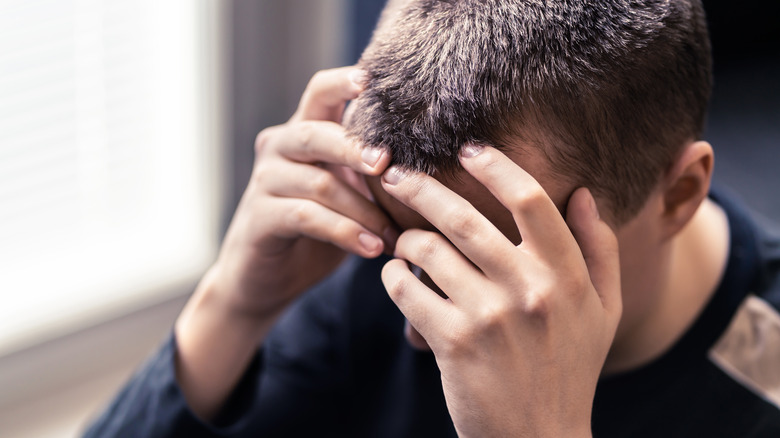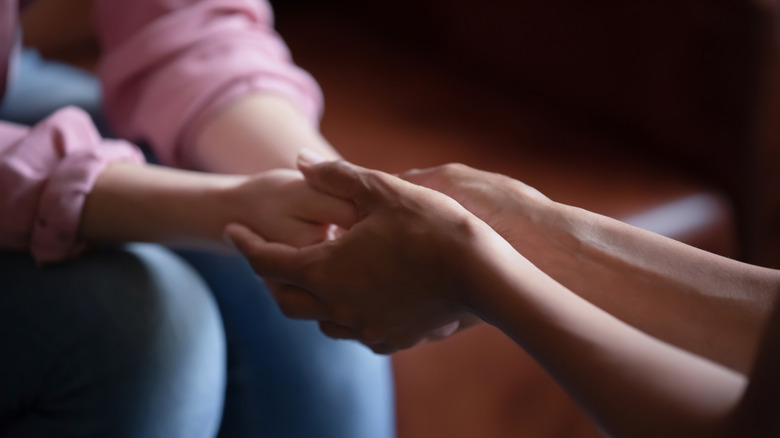How To Avoid Being Socially Awkward
To say that we've all had social flubs and embarrassing moments is a grave understatement — truly everyone has at least one story of saying the wrong thing, like calling a new coworker by the wrong name or accidentally saying something inappropriate. If you don't think back on some of your past experiences and cringe just a little, well, how can you be sure you're human? Even our perfectionists out there have had experiences they don't write home about (even though they wouldn't admit it).
For some, though, social awkwardness is not just a one-off occurrence but the norm. This can be an anxiety-inducing, painful mentality to live with, making interpersonal relationships, workplace dynamics, and familial interactions that much more difficult. But, we're here to tell those of you living with social awkwardness that it doesn't have to be this way. Thankfully, there are a number of simple tricks to help you survive and even thrive in social situations.
Are you socially awkward or do you have social anxiety?
Social awkwardness and social anxiety are two different beasts — though the two conditions have quite a bit of crossover. Referencing a study by researcher Johsua Clegg, Research Digest explained that "social awkwardness is what we feel when the situation threatens our goal of being accepted by others." The condition can manifest as a failure to take notice of societal expectations, the inability to navigate a social setting, an intense increase in focus (so much so that social interactions are ignored), and a lack of understanding where social graces are concerned.
Social anxiety, on the other hand, is a disorder that manifests itself similarly, but has additional layers of "emotional stress in social situations," according to King University. The school highlighted the common issues that someone with social anxiety fears, including being criticized, being introduced to someone new, interacting with a higher-up at work, public speaking in any capacity, existing at the center of public attention, interacting in interpersonal relationships, and more.
Establish the severity of your social awkwardness or anxiety
While official diagnoses should be left to the professionals, you may be wondering if there is a scale or test you can take to determine the severity of your social awkwardness or social anxiety. Luckily, there are some relatively accessible options out there on the internet — provided by reliable sources — that can be used to determine where your social worries fall.
For instance, a questionnaire is available through the OCD Center of Los Angeles. The online test is relatively quick and consists of questions and checkboxes — simply check next to the given statement if it applies to your life. Some of the phrases include, "I often worry that I will say or do something wrong or inappropriate, or that I will commit some sort of social error," and "I become upset, anxious, and/or depressed when I think someone disapproves of me." After the test, the OCD Center will send you an email with your results, explicitly stating that while the questionnaire is not a "formal diagnosis," it can give you a better understanding of your own social hurdles. Bonus: This test is free of charge.
If you're looking for something a little more in-depth, Psychology Today provides a 10-minute social anxiety questionnaire. After completion, you will get a free "snapshot report" of your results, or you can pay $6.95 for your full results.
Acknowledge your discomfort, but don't run away from it
It can be a game changer to sit in your feelings of discomfort and acknowledge your thoughts rather than kick them to the back of your brain and exit whatever awkward situation you find yourself in. Clinical psychologist Joel Minden told Verywell Mind that checking in with yourself is the first step in addressing social anxiety and awkwardness, as admitting your feelings and tackling them head-on could be part of the solution you're looking for. "Accept [your feelings of discomfort] — and then redirect your attention and behavior to the other person," Minden explained. "Socially effective people show interest in others and their interactions."
The psychologist further detailed that people who experience social awkwardness likely try to get out of said interaction as quickly as possible "because they are so uncomfortable." But rather than running away, try to sit in your feelings for a moment and then work your way through the interaction.
Work on being an active listener
If one of the cornerstones of your social awkwardness stems from speaking to other people – whether during a one-on-one conversation or in a group situation – we have a solution for you. Speaking up may not be your forté, and that's okay. Instead, try participating in the conversation as an engaged listener, as this will not only ease your worries surrounding speaking but will maintain your presence and give those around you the opportunity to feel seen and heard.
Science of People noted that engaged listening doesn't mean just standing around in a circle and giving someone else the chance to speak. Rather, it is a process of employing eye contact, using subtle cues such as head nodding, and verbalizing positive reinforcements (e.g., "wow" or "oh"). As your group's speaker slows down or completes their thought, try engaging with them by saying phrases like, "That was really interesting," or "I'd like to learn more about this." By acknowledging your social interaction and letting the speaking person know you're engaged, the chances for awkward encounters diminish.
Furthermore, the University of Rochester recommends engaged listeners go into a conversation with an open mind and really pay attention to the details of someone's story, rather than presenting a scripted response that's clearly been rehearsed.
Dismantle your ideas of perfectionism
Threads of perfectionism can be intertwined with the very real feelings associated with social awkwardness. Perfectionism is the personal tendency to set and (try to) maintain lofty goals, all while being incredibly hard and judgmental on yourself if said goals aren't met without a hitch. Being a perfectionist can be as simple as meeting work goals the first time around or as complex as needing everything – from interpersonal relationships to work comings and goings to living arrangements – to be absolutely faultless. Living life as a perfectionist, then, can come with a lot of anxiety involving interactions, as they may not go to plan or unfold as flawlessly as you may like.
Research fellow Marianne E. Etherson broke down the complications of perfectionism in a piece for Psychology Today, writing that those with social anxiety share a very common thread with that of perfectionists – setting "unrealistic standards for performance in social situations." She continued, writing, "Given their underlying sense of inferiority and tendency to view themselves negatively, they criticize themselves harshly when they do not meet their standards. Indeed, situations of interpersonal evaluation and the prospect of being judged by others are extremely threatening."
If you're determined to quiet your inner critic and ease your social anxiety or social awkwardness, start dismantling the idea – perhaps with a therapist – that everything in your life has to be perfect all the time.
Watch how you describe yourself to other people
One of the biggest hurdles when it comes to social awkwardness and anxiety is perception, but not in the way you may think. While those battling social tension and stress may worry about what everyone is thinking of them – from the way they look to how they interact with others – likely the loudest source of judgment is coming from their own perception of themselves. Science of People noted that one of the best things a socially awkward person can do in their quest to tamper down their stressful tendencies is to actively work on changing their internal and external narrative, as negatively speaking about themselves to others could be doing way more harm than they realize.
For instance, if you're a socially anxious person, notice if you have a tendency to say, "I'm super shy, sorry," "I don't know how to talk to other people," or phrases of that nature. When you explicitly present yourself to others as an anxious or awkward person, you're likely to live up to that set standard.
Amy Morin, a licensed clinical social worker, took things one step further and explained in an article for Psychology Today that the way we speak to and about ourselves – amid the average 60,000 thoughts we have daily – can make a huge difference when it comes to our own social anxiety levels.
Take small steps to work on maintaining eye contact
Perhaps one of the most significant signs of social anxiety or awkwardness amid an interaction with another person is eye contact. Making and maintaining eye contact may not seem like the hardest thing to achieve for most people, but for some, it's a nightmare. There is actually an aspect of social anxiety disorder that specifically targets eye contact, according to Verywell Mind. When trying to look someone in the eye, a person with social anxiety disorder may undergo a trigger from their brain (the amygdala) that tells them that they're in a dangerous situation. This can be difficult to overcome, but it is possible.
A rule of thumb when it comes to improving anything in life is practice, and this logic can be applied to eye contact. But given the stressors that can easily be triggered for those who are socially awkward or anxious, it's a good idea to practice in the safety of your own home. For a jumping off point, try making eye contact with characters in a TV show, or FaceTime a trusted friend.
Be mindful of empathy and extend it to yourself and others
We live in a world that seems faster, angrier, and more hectic than ever before – is it any wonder so many people live with a degree of stress, anxiety, depression, or a combination thereof? If you're dealing with social awkwardness or anxiety on a level that's impacting your day-to-day interactions, it's really important to remember that you're absolutely not alone. Furthermore, one of the best ways that you can avoid being socially awkward – while also extending understanding and grace to yourself – is to work on being empathetic.
As noted by WebMD, empathy is the ability to understand and relate to another person's experience, and serves as a stepping stone in extending kindness to others. Being empathetic is a human instinct, but some people are more prone to empathetic understanding than others. If you find yourself unable to relate to others – or have a hard time connecting to the people in your life – working on empathy could be a huge help.
So how does one become more empathetic? First and foremost, try exercising the feeling of being curious about other people's lives (via WebMD). Everyone has a story, and the more you listen (reference our listening tips higher up), the more you can learn about someone new. When working on your empathetic nature, it's vital to identify what you have in common with someone, versus what your differences are.
Practice your social skills with a trusted friend or family member
We've taken you through a number of steps at this point to help you manage your social awkwardness and anxiety – work on active listening, watch how you describe yourself to other people, and be mindful of your empathy towards yourself and others – but how do all of these skills come together? Like trying to maintain eye contact, practice makes perfect, but that might be easier said than done. So, in your quest to avoid social awkwardness, we suggest practicing your newly developed skills and coping mechanisms in low stakes situations, as noted by Science of People. By engaging with people in a less pressured instance, you may feel more comfortable practicing these skills than you would interacting with a boss, mentor, or date.
So what kind of interactions can serve as practice points? Start with trusted family members or friends – people who know, love, and support you no matter what. These people already have your best interest in mind, so they're a great place to start. As you start to feel more comfortable, try engaging with your local barista, the cashier at the grocery store, or perhaps a bartender (if you're really feeling like going for it). From there, you can work your way up to interacting with your boss – or even a date – in a stress-free, non-awkward way.
Make positive affirmations a part of your daily routine
Self-care and meaningful progress toward lowering your anxiety and stress comes from practice. Whether that's therapy, meditation, breaks throughout the work day, or a combination thereof, it's incredibly important to intertwine your self-care habits with opportunities to decompress. The more at peace you are with yourself, the less likely you are to feel awkward or anxious in social interactions. But if therapy or meditation alone simply isn't cutting it, consider adding positive affirmations into your life – it's such a simple, time-efficient practice, but it really could go a long way.
Psychologist Catherine Moore wrote for Positive Psychology that there is science behind the effectiveness of positive affirmations, asserting that it is an "extremely simple" step that merely involves a phrase and repetition. So, for instance, if you experience social awkwardness regularly, you might want to focus on a phrase such as, "I am more than what other people may think of me" or "I am confident in my ability to communicate."
Once you've settled on a phrase, simply repeat it to yourself – this could take the form of a verbal repetition or written, but either way, the constant affirming practice is the key. It may sound a little like "fake it 'til you make it," but positive affirmations can really help in solidifying your own train of thought and confidence.
Pick up on non-verbal cues and body language
One of the biggest cues you can take when you're in the moment may not come from what a person is saying with their words, but what they're saying with their body. Body language is a huge part of any social interaction, and it can truly speak for itself
If you find yourself consistently feeling awkward around other people, you may want to start paying more attention to someone's body positioning. Forbes noted that aspects such as someone's tone, eye contact, body posture, facial expressions, and movement can serve as a language in and of itself. While it's far subtler than what they're actually saying with words, tuning into their body movement could save you from an awkward interaction.
Take this scenario,for example: You're standing in a circle of coworkers and you're telling a story about your recent vacation. But after a couple of minutes, you notice that the people who should be paying attention are starting to look around, glance down at their phones, or even wander off. This might be a sign that you should wrap it up.
Remember that being socially awkward isn't a curse
Being socially awkward or even socially anxious may have steered you into some pretty cringey moments with other people, but when all is said and done, being socially awkward isn't a curse. We would be remiss not to highlight how being socially aware could be a blessing in disguise. Healthline noted that people who are socially awkward likely have a tendency to be very tuned in to what is going on around them – the setting they are in, the quickest way to escape, et cetera. While this might be a coping mechanism, it's not the detriment you may think it is.
Being aware of yourself and having what Healthline calls an "internal warning system" could save you from some seriously consequential situations. A 2012 study published in Qualitative Research in Psychology found that those who are socially awkward are more likely to take action when a moment becomes dangerous, and they will most likely learn from social situations far more so than others (via Healthline). Furthermore, those who get awkward around other people quickly have a tendency to skip the small talk – as it makes them anxious – and instead opt for deeper talks. And, with all of this said, don't think that being socially awkward automatically makes you a poor conversationalist. All you need is a little bit of practice, some tips and tricks, and positive affirmations, and you'll be well on your way.












